December 15, 2024 | 21:36 GMT +7
December 15, 2024 | 21:36 GMT +7
Hotline: 0913.378.918
December 15, 2024 | 21:36 GMT +7
Hotline: 0913.378.918
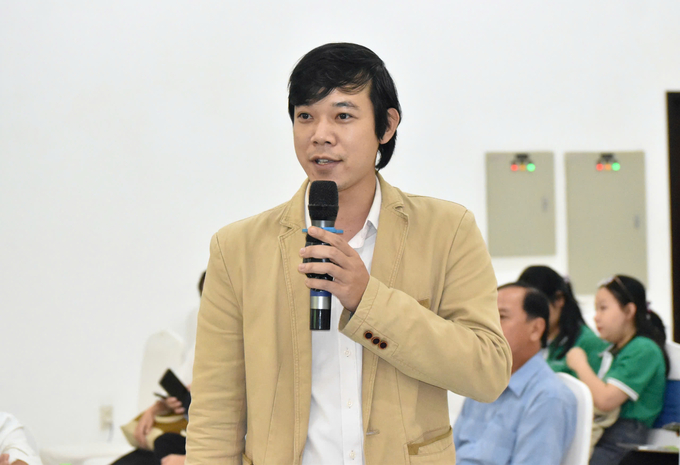
Mr. Nguyen The Phuong, Deputy Director of Global Connection Food Company. Photo: Minh Dam.
Vietnam is regarded as one of the world's top coconut producers and exporters. However, coconut prices can occasionally plummet to as low as 1,000 VND per fruit in the country, leaving farmers with concerns and uncertainty about this crop.
In addition to the challenge Nguyen Thi Kim Thanh, the Chairwoman of the Vietnam Coconut Association, stressed that the coconut processing industry is experiencing a severe shortage of basic materials. Despite the fact that numerous businesses have established facilities and factories in Ben Tre, the nation's coconut center, the province's coconut supply remains insufficient. Therefore, numerous organizations have been forced to suspend or reduce their operations, operating at only 10-15% capacity.
Many businesses have established facilities for preliminary processing of dried coconuts in recent years, as a result of the 0% tariff on dried coconut raw materials. These coconuts are then exported to China for further processing.
Additionally, Indonesia, the world's largest exporter of dry coconuts, will implement an 80% export tax on coconuts beginning January 1, 2025, in order to protect its domestic resources and attract investment. In addition, this situation poses a further risk to the supply of dried coconuts for Vietnam's export-oriented enterprises.
"Our coconut sector will undoubtedly decline if we fail to establish tariff barriers and implement timely tax policies to retain coconut raw materials for the domestic processing industry," Thanh cautioned.
The Chairwoman also noted that coconut prices in regions with robust infrastructure, such as Ben Tre, range from 7,000 to 10,000 VND per fruit. However, prices are substantially lower in regions with inadequate infrastructure. A prompt resolution to this matter is urgently required.
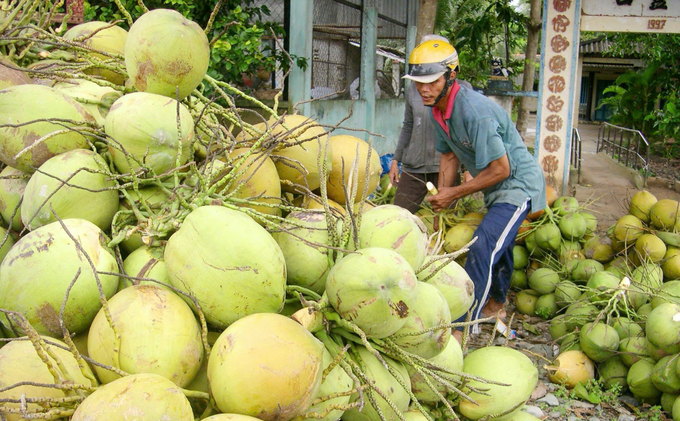
Coconut prices in the domestic market are not really stable. Photo: Le Hoang Vu.
Mr. Nguyen The Phuong, Deputy Director of Global Connection Food Company, underscored the significance of a triangular relationship among farmers (producers), businesses (consumers), and local authorities (supporters) when discussing the production of fresh coconuts in Tien Giang. He is of the opinion that the coconut industry's development is contingent upon sustainable, transparent, and equitable collaboration.
Phuong elaborated, "Sustainability is the cornerstone of ensuring that all stakeholders experience steady and upward growth."
In an effort to protect the interests of all stakeholders, he underscored the necessity of transparent policies that involve the government, associations, and NGOs. Yet, he noted that the current forums primarily concentrate on technical support, neglecting to address specific policy requirements.
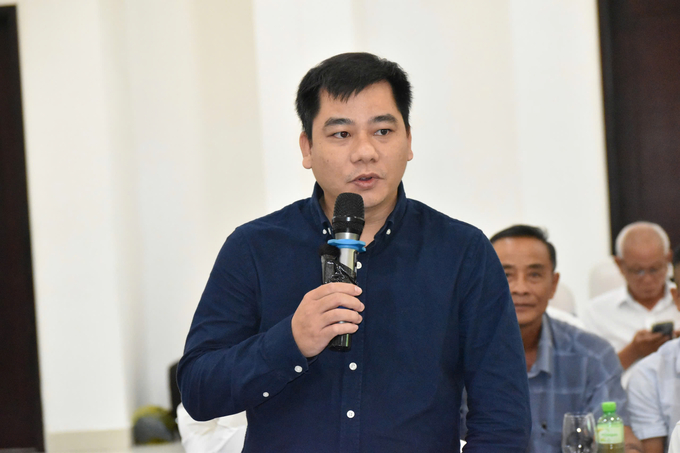
Mr. Dang Dinh Long, Chairman of the Board of Directors of Mega A Logistics Company. Photo: Minh Dam.
Mr. Phuong suggested the creation of policies that are specifically designed to optimize the procurement and consumption of coconuts for businesses, taking into account the characteristics of the coconuts (fresh or desiccated) and each stage of the supply chain. For example, in times of scarcity, policies should encourage local consumption, while in times of plenty, such as June and July, localities and businesses should increase exports.
Mr. Phuong also underscored the significance of harmony in the supply chain. In order to engage in an effective manner, farmers have to understand their responsibilities and benefits. He observed that producers function as traders in the durian industry, thereby guaranteeing equitable and transparent transactions.
Farmers are able to overcome obstacles in the export supply chain by exchanging information regarding market demands, regardless of whether they originate from China or the United States. Businesses foster trust among stakeholders by procuring at reasonable prices, which in turn maintains stability.
Mr. Dang Dinh Long, Chairman of the Board of Directors of Mega A Logistics, has stated that the logistics sector has collaborated with agriculture to reduce costs, thereby enhancing the competitiveness of Vietnamese coconuts.
Currently, the most cost-effective solution apart from transporting coconuts by road through border checkpoints is sea transport. Furthermore, cold chain systems (storage facilities, refrigeration) for exports to China have been enhanced and upgraded, thereby facilitating a more extensive penetration of the Chinese market, including northern provinces.
These logistics channels result in a total transportation cost of only approximately 3,000 VND per coconut. Additionally, the General Administration of Customs in China conducts a rapid inspection and clearance of plantation codes and packaging facilities in less than 12 hours.
Businesses are required to comply with specific classifications, tax rates, and technical standards in the importing countries when exporting processed coconut products by sea. In order to ensure that production is in accordance with regulations, it is essential that companies conduct an in-depth review.
Translated by Linh Linh
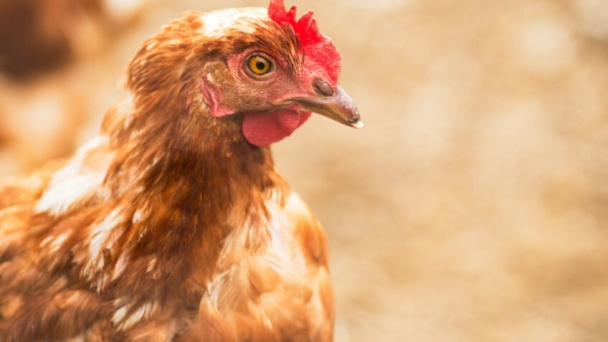
(VAN) A review of 5 European nations commitment to ending the raising of layers in cages has found that Poland is struggling to keep up with western European nations.

(VAN) The Mercosur agreement will have devastating consequences for European food security, sustainability, farmers and consumers alike…

(VAN) The establishment of a Vietnamese rice brand necessitates that enterprises build their own 'identity' by maintaining consistent quality and fostering consumer trust.
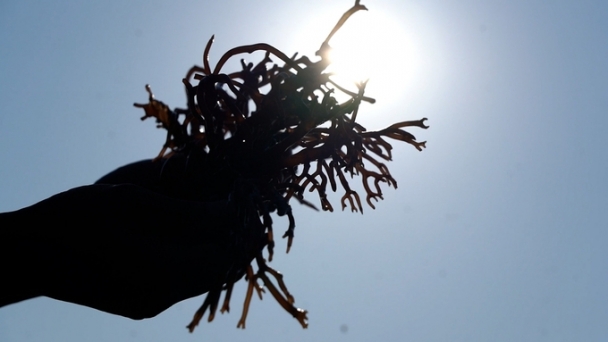
(VAN) As stakeholders engage in collaboration and participation, the value chain becomes more comprehensive and sustainable, thereby advancing Vietnam's seaweed industry to greater heights.

(VAN) Inaugural gathering of global platform is co-organized by Thailand and FAO.
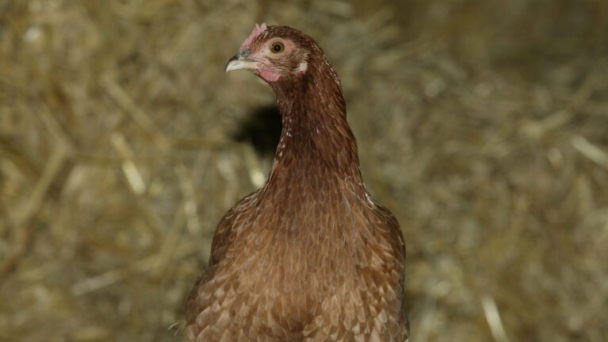
(VAN) Unprecedented concerns from UK farmers over proposed changes to the RSPCA’s Welfare Standards for Laying hens have led to a further climbdown by the assurance scheme.